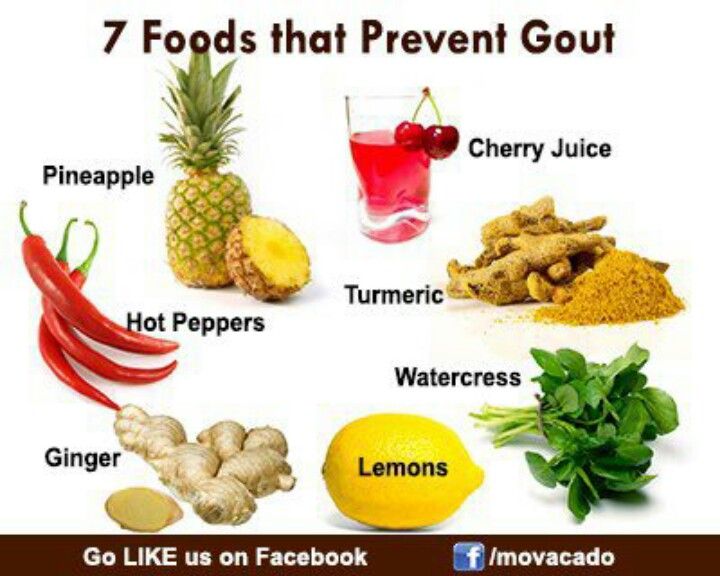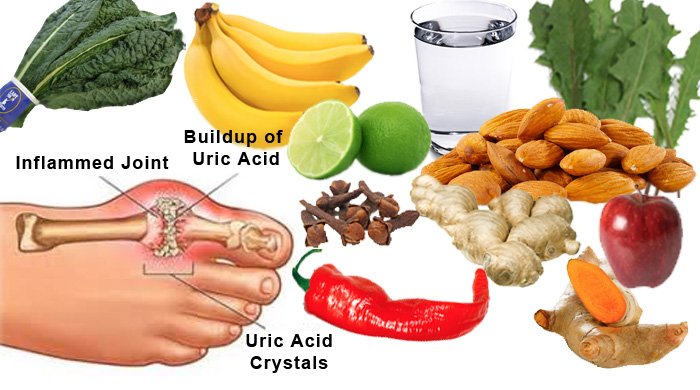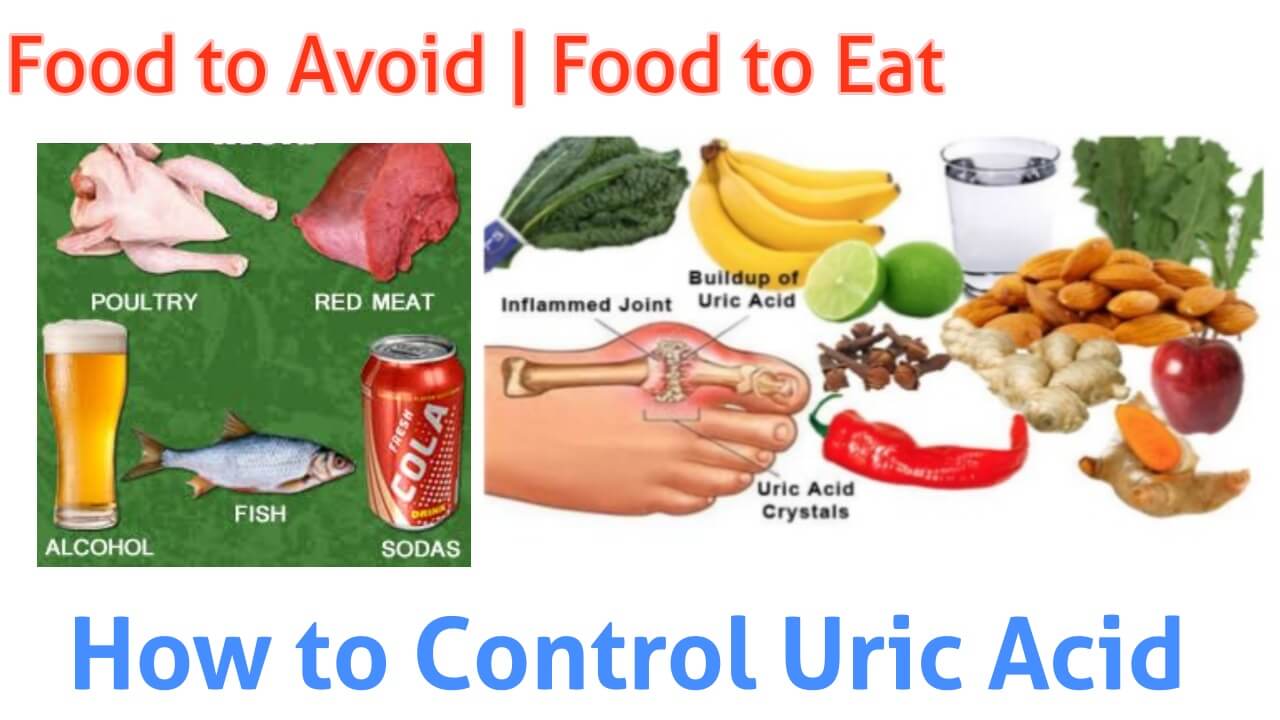What Foods Should You Eat
Although a gout-friendly diet eliminates many foods, there are still plenty of low-purine foods you can enjoy.
Foods are considered low-purine when they have less than 100 mg of purines per 3.5 ounces .
Here are some low-purine foods that are generally safe for people with gout (20,
- Fruits: All fruits are generally fine for gout. Cherries may even help prevent attacks by lowering uric acid levels and reducing inflammation (
- Vegetables: All vegetables are fine, including potatoes, peas, mushrooms, eggplants and dark green leafy vegetables.
- Legumes: All legumes are fine, including lentils, beans, soybeans and tofu.
- Nuts: All nuts and seeds.
- Whole grains: These include oats, brown rice and barley.
- Dairy products: All dairy is safe, but low-fat dairy appears to be especially beneficial (
- Beverages:Coffee, tea and green tea.
- Herbs and spices: All herbs and spices.
- Plant-based oils: Including canola, coconut, olive and flax oils.
Minerals Good For Alleviating Your Gout Symptoms
Zinc oxide nanoparticles have the potential to reduce oxidative stress. It is also useful for treating gouty arthritis. Moreover, magnesium is another element for lowering the amount of uric acid. Almonds, kale, mustard greens, and several other foods contain magnesium. Thus, choose the right foods, which contain gout-friendly minerals.
Suggested article: Magnesium and Gout Is Magnesium Good for Gout?
Am I At Risk Of Having Gout
Youre more likely to have a gout attack if you:
- are male
- have a family history of gout
- have elevated levels of uric acid in the blood
- drink too much alcohol
- eat a diet high in purines such as meat, sweetbreads, offal, shellfish, and fructose
- are overweight or obese
- use diuretics
- have type 2 diabetes, high blood pressure or high cholesterol these conditions can mean that your kidneys are less able to flush out the urates
- have kidney disease
You May Like: Are Almonds Good For Gout
Plenty Of Starchy Carbohydrates
These may include rice, potatoes, pasta, bread, couscous, quinoa, barley or oats, and should be included at each meal time. These foods contain only small amounts of purines, so these along with fruit and vegetables should make up the basis of your meals. Wholegrain varieties are better choices as they contain more fibre and nutrients.
What Increases Your Chances For Gout

The following make it more likely that you will develop hyperuricemia, which causes gout:
- Being male
You May Like: Gout And Tofu
Things To Cut Down On
Meat and seafood
High intakes of red meat and seafood are associated with a greater risk of gout because of their high purine content and impact on uric acid production.
Foods that contain yeast, such as Vegemite and Marmite, are also high in purine.
Sugars
Fructose is a simple sugar found in honey, fruit, some vegetables and sweeteners. Fructose increases purine metabolism, raising blood uric acid levels.
Avoid sweeteners high in fructose such as honey, brown sugar, high-fructose corn syrup, golden syrup and palm sugar. Check your tolerance for fruits, vegetables and other foods high in fructose.
Uric acid levels tend to be higher in people who regularly consume sugar-sweetened drinks. Those drinking one to two sugar-sweetened soft drinks a day are almost twice as likely to have gout as those who drink only one a month.
When it comes to whole fruit, results are not clear. While one study found a higher risk of gout with higher fruit intakes, another found a lower risk. The opposing results are partly confounded by the variation in fructose content of different fruits.
Alcohol
The effect of specific alcoholic beverages on blood uric acid levels varies. Beer is high in purine and increases uric acid more than spirits, while moderate wine intake appears neutral.
What Happens At Your Appointment
The GP may ask about your diet and if you drink alcohol.
They may refer you to see a specialist and arrange a blood test and scan. Sometimes a thin needle is used to take a sample of fluid from inside the affected joint, to test it.
The blood test will find out how much of a chemical called uric acid there is in your blood.
Having too much uric acid in your blood can lead to crystals forming around your joints, which causes pain.
Don’t Miss: Gout In Heel Pictures
Which Foods Should You Avoid When You Have Gout
Purines are compounds that are found in specific food and drink and they change to uric acid in the body. Most meat and seafood are high in purine and can increase uric acid levels in the body. These therefore should be limited during episodes of a gout attack and portion size should be reduced. Common examples of foods high in purine include anchovies, sardines, offal foods such as liver, kidney, sweetbreads, game, goose, minced meat, mussels, partridge, roe, scallops, herring, gravies, stock cubes and meat and yeast extracts.
Can Dietary Supplements Help
People with gout are sometimes advised to take vitamin C supplements because they are believed to lower uric acid levels. But there has only been one good-quality study on the effectiveness of vitamin C in gout. That study found that vitamin C had a weak effect on uric acid levels, but the researchers didnt look into whether that also lowered the risk of gout attacks.
You May Like: Almond Milk And Gout
What Fruits And Vegetables Are Good For Gout
cabbagesquashbell pepperbeetrootasparagusspinachcauliflowermushrooms
Similarly, what foods reduce uric acid?
Tips for increased uric acid levels and gout
- Watch your weight.
- Eat fresh fruit, vegetables, whole wheat products and some pulses every day.
- Enjoy low-fat milk and dairy products daily.
- Keep an eye on the purine content of food.
- Eat no more than 100g of meat, sausages, fish and poultry a day.
Which foods to avoid with gout?
Alcoholic beveragesfishseafoodshellfishanchoviessardinesherringtroutmeatsbaconturkeyvealvenisonorgan meatsliver
What foods can you eat if you have gout?
Foods to Avoid to Control or Prevent Gout
- Red meat.
- Certain types of seafood
- Products containing high-fructose corn syrup.
What Role Do Purines Play
An estimated 70% of uric acid in the blood is made inside the body. This means that even by following a strict low-purine diet, it will only be possible to lower uric acid levels by 30% at the most. But not all foods are the same: Our bodies absorb purines differently from different foods, so it might not make sense to avoid all foods that contain purines especially if you already eat a balanced diet. There are no high-quality studies on the effectiveness of strict low-purine diets. Besides, they can be quite difficult to stick to.
Also Check: Is Almond Milk Good For Gout
Ways To Deal With Painful Gout Attacks
Its difficult to focus on work or other daily activities when youre experiencing gout inflammation and pain. Symptoms can last for a few days or even weeks, with the worst pain usually occurring in the first day or two.
While the best thing to do is talk to your physician, there are several steps you can take right away ease your gout symptoms:
Excess uric acid in the bloodstream can lead to the formation of uric acid crystals in one or more joints, resulting in gout.Read:All About Gout – Symptoms, Diagnosis, Treatment
Most Soy Should Be Fine

Soy foods like tofu, soy milk, and edamame have moderate amounts of purines. Traditionally doctors have cautioned against eating too much soy for people with gout. One study found that soybeans, soymilk, and soy powder increased uric acid in the blood significantly. However, larger population studies have recently told a different story. Several have reported that not only are soy products harmless for gout patients, but also people who eat more soy tend to have a reduced gout risk.
Don’t Miss: Almonds Good For Gout
What Are The Symptoms Of Gout
If you think you are suffering from gout, how can you be sure? One of the tell-tale signs of gout is excruciating swelling and pain in the big toe, usually resultant of an injury. Gout may affect other joints intermittently, though, most often it affects the joints in the foot and knee. If left untreated, gout can become a chronic condition.
If you do not treat gout symptoms, your body may produce something called tophi which are little crystals that form disfiguring lumps near your joints and can also produce painful kidney stones.
Some Meat Fish Eggs Beans And Pulses
Eat these foods in moderation. Having vitamin C with meals can help to improve the absorption of iron, so drink a small glass of orange juice, have a piece of fruit for dessert, or serve up meals with plenty of vegetables. Keep your portions of meat controlled by using your hands as a serving size guide. A serving is about the size and thickness of the palm of your hand.
You May Like: Are Oranges Good For Gout
Be Choosy About Carbs
Carbs can be helpful or harmful to your gout health. The most helpful carbs are found in whole grains, fruits, vegetables, and legumes. Sweet potatoes, beans, apples, and popcorn can all be served in wholesome and delicious ways as part of a healthy gout diet.
Other carbs come as natural and refined sugars. Candy, sports drinks, some breakfast cereal, and some pasta sauces all contribute to dietary sugar from unhealthy carbs.
Gout Diet: Dos And Donts
Maintaining a balanced diet, low in uric acid, is critical for lowering the risk of a gout attack. Learn which foods and beverages you should eat and which ones to avoid.
1. What You Eat and Drink Matters
2. DO: Drink Water
3. DONT: Drink Beer
4. DO: Drink Milk
5. DONT: Drink Liquor
6. DO: Drink Coffee
7. DONT: Drink Soda
8. Do: Eat Citrus
9. DONT: Eat Organ Meats
10. DO: Eat Vegetable Proteins
11. DONT: Eat Certain Seafood
12. DO: Eat Cherries
Nutrition
Read Also: Pistachios Nuts And Gout
Foods And Drinks That May Be Good For Gout
Water
Drinking plenty of water and staying hydrated is important if you have gout. Aim to drink at least eight 8-ounce glasses of water each day. Drinking water can help keep uric acid from building up and help release it from your body. If you have fluid restrictions because of kidney disease, talk to your doctor or dietitian about managing your fluid and gout
Cherries and foods with vitamin C
Some foods like cherries and fruits and vegetables high in vitamin C have been shown to lower the level of uric acid in your blood, which can have a positive effect on gout. Some examples of foods high in vitamin C are:
- Oranges
What Is Good For Gout
Ask U.S. doctors your own question and get educational, text answers â it’s anonymous and free!
Ask U.S. doctors your own question and get educational, text answers â it’s anonymous and free!
HealthTap doctors are based in the U.S., board certified, and available by text or video.
You May Like: Is Rice Good For Gout
You Can’t Avoid All Purines
There are too many sources of purines to eliminate them all from your diet. You will stay healthier overall if you eat some foods with purines. Remember that vegetable purines have never been shown to promote gout attacks, and that low-fat dairy products are protein sources that lower your risk of gout pain. People with gout can still enjoy meat in moderation, but should limit meat, fish, and poultry to 4 to 6 ounces a day.
Why Do People Get Gout

Gout is a type of arthritis causing pain and swelling in the joints. The symptoms usually occur as flares lasting for a week or two and then go away. Gout flares usually start in the big toe or a lower limb.
The disease happens when the body has high levels of a substance called uric acid or urate. When high levels of uric acid build up, the needle-shaped urate crystals form in and around the joints. This causes inflammation and arthritis of the affected joint. Many people with high serum uric acid, however, may not develop gout.
Some factors may increase a persons risk for gout, including
- Male gender
Gout is a lifelong disease and cannot be cured. The disease, however, is one of the most controllable forms of arthritis. It can be effectively managed with early diagnosis, medications and lifestyle changes.
Also Check: Is Onion Bad For Gout
Warm Water With Apple Cider Vinegar Lemon Juice And Turmeric
Apple cider vinegar, lemon juice, and turmeric are each frequently recommended anecdotally for gout. Together, they make a pleasant beverage and remedy.
No strong research supports apple cider vinegar for gout, though studies show it may support the kidneys. Otherwise, research is promising for lemon juice and turmeric for lowering uric acid.
Mix juice from one squeezed half lemon into warm water. Combine with 2 teaspoons turmeric and 1 teaspoon apple cider vinegar. Adjust to taste. Drink two to three times per day.
Take Your Prescription Drugs
If you’ve had a gout attack before, your physician may have prescribed drugs to treat attacks. This may be your first line of defense or you may decide to use them only when NSAIDs fail to relieve your pain.
Prescription medications to treat gout include:
- Prednisolone oral tablets, which has been shown to work as well as NSAIDs and often doesnt cause the same stomach upset. Prednisolone is a type of corticosteroid and does carry other potential side effects, particularly if it is taken for longer than the recommended 5 days.4
- Colchicine, which has been shown effective in reducing pain and inflammation if taken in the first 24 hours of an attack. Always follow your physicians instructions regarding dosing to decrease your risk for potential complications and side effects.
Opioid painkillers, such as codeine, hydrocodone, and oxycodone, are not recommended to treat the pain caused by gout.
See Pain Medications for Arthritis Pain Relief
Also Check: Onion And Gout
Whats The Outlook For People With Gout
Untreated gout can lead to permanent joint damage. The buildup of uric acid in the joints and soft tissue is called tophus. Some people with gout can also develop other health problems, such as severe arthritis, kidney stones and heart disease. Its important to discuss your symptoms with a healthcare provider.
What Foods Are Good For Gout
Dietary management of gout focuses on reducing the amount of uric acid in the system and attaining and maintaining a healthy body weight.
Foods that may help keep gout in check are
- Fresh fruits and vegetables such as berries, oranges, bell pepper and pineapple
- Low-fat dairy products, such as yogurt and skimmed milk
- Nuts including nut butters such as almond butter and peanut butter
- Whole grains
- Potatoes, rice, whole-grain bread and pasta
- Eggs
- Oils such as olive oil
- Flax and other seeds
Recommended Reading: Side Effects Of Allopurinol And Alcohol
What Effect Do Your Weight And Diet Have
Some studies suggest that certain foods are linked to gout attacks. Gout attacks are apparently more common in people who have eaten a lot of meat, fish or seafood a few days before. That matches many people’s experiences. On the other hand, purine-rich plant-based foods such as peas, beans, lentils, spinach, mushrooms, oats, cauliflower and broccoli were found to have little to no effect on the risk of a gout attack. Overall, there hasnt been much good quality research into the link between certain foods and gout attacks.
Eating cherries is sometimes recommended to prevent gout attacks, but theres no scientific proof that it can help prevent gout.
Because not everybody has the same metabolism, its a good idea to try out for yourself what helps you and what doesnt and how much of different foods your body tolerates. Some people feel better after changing their diet, while others successfully lower their uric acid levels with medication and cope just fine without any changes to their diet.
Individual studies also suggest that losing weight can help if you’re very overweight. People with gout should be careful not to go without any food, though fasting can itself trigger a gout attack.
Plenty Of Fruit And Vegetables
The recommendation is five portions per day, but try to include as many as possible. Bulking out meals, such as Bolognese, casseroles and stews with vegetables can help to reduce the meat content. Fruit and vegetables contain vitamin C. Although evidence is unclear, high intakes of vitamin C may help to reduce uric acid levels in the blood. Cherries may be particularly useful to include in the diet, as they have also been found to reduce levels of uric acid in the blood.
Also Check: Almond Good For Gout
Gout And Diet: Foods And Drinks To Avoid
Gout is an arthritic condition that can cause sudden, severe joint pain. If you are experiencing symptoms of gout, the NHS recommends that you see a doctor for treatment during an attack and to help prevent further attacks.
We asked Emer Delaney, a dietitian who has worked in some of London’s top teaching hospitals, to explain how diet and lifestyle can affect the condition.